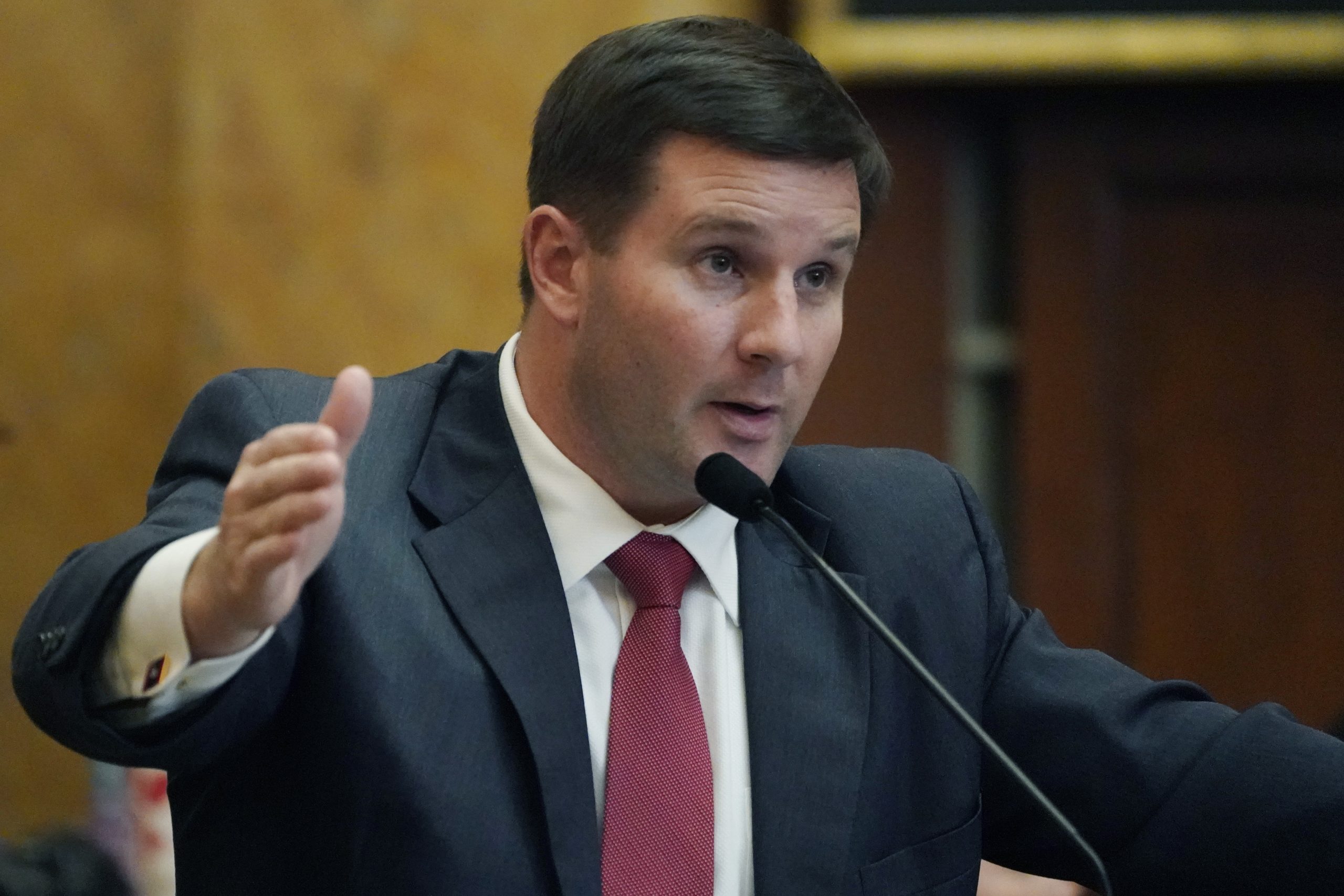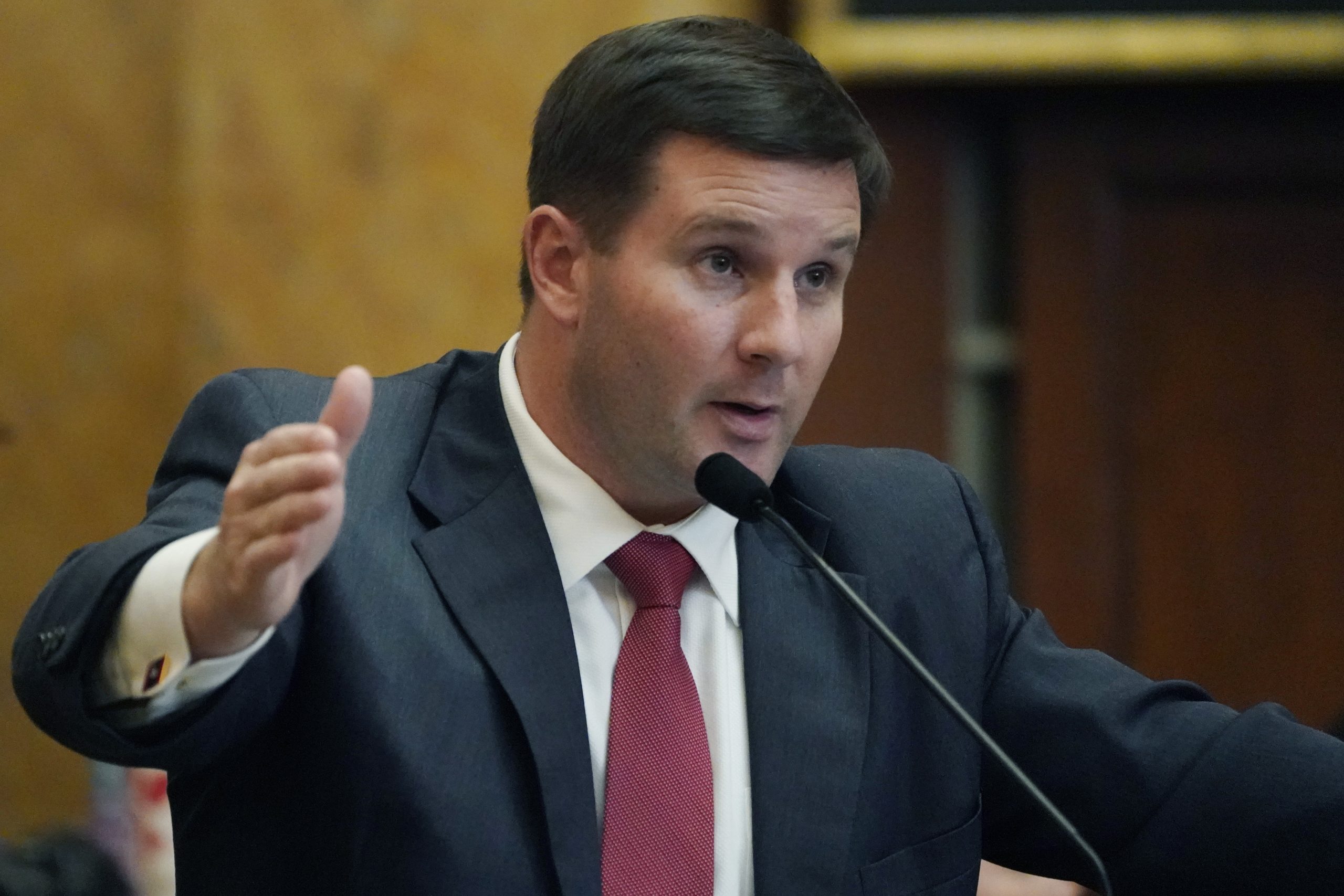Mississippi Today
Tax cuts, rebates fizzle from lack of GOP support in Legislature


Tax cuts, rebates fizzle from lack of GOP support in Legislature
With a Wednesday deadline for action on major tax cuts, elimination or rebates, Republican House and Senate leaders said such measures don’t appear likely, largely due to lack of support from fellow Republicans who hold supermajorities in both chambers.
“There’s tremendous support to eliminate the tax on work (income tax) in the Mississippi House of Representatives,” Ways and Means Chairman Trey Lamar, R-Senatobia, said Tuesday. “… But a small group in the Republican Caucus doesn’t want us to take it up, and we are on notice the Democrats are going to block vote against it. It’s a three-fifths vote, so that’s where it’s at.”
In the Senate, Republican Lt. Gov. Delbert Hosemann had vowed to push for income tax rebate checks for Mississippians. But Finance Chairman Josh Harkins, R-Flowood, on Tuesday said many in the Senate are more focused on “paying off debt, not taking on more debt, infrastructure needs and a lot of other financial issues to consider.”
READ MORE: Phase out income tax or cut taxpayers checks? GOP lawmakers, governor disagree
Hosemann late last week had lamented lack of support for his tax rebate checks proposal in the Senate and said, “I still think it’s a good idea.”
The Legislature, after much internecine Republican fighting that threatened to derail much other legislation, last year passed the largest income tax cuts in state history, to be phased in over four years. House Speaker Philip Gunn had pushed for eliminating the state income tax. Hosemann had pushed for more measured cuts. The end result: Mississippi after the cuts are fully made in 2026 will have one of the lowest income taxes in the nation.
READ MORE: 5 things to know about the Great Mississippi Tax Cut Battle of 2022
But tax revenue has continued to pour in at record pace, and there’s a $3.9 billion surplus in state coffers. This prompted Gunn to re-up his vow to eliminate the personal income tax, and Hosemann to advocate one-time rebate checks for taxpayers and talk of cutting or eliminating the state’s sales tax on groceries, among the highest in the nation.
Hosemann and Senate leaders said the national and state economies are in turbulent, inflationary times with recession possible, and that much of the state surplus is from unprecedented federal spending that isn’t likely to continue. They warn that fully eliminating the income tax in such uncertain economic times is foolhardy. Many state business leaders, including the state’s chamber of commerce,shared this trepidationlast legislative session.
Gunn and and House leaders said Mississippi’s economy is on a roll that will continue, and that eliminating the personal income tax would help the state compete for economic development. Gunn points to nine states with no income tax, including Florida, Tennessee and Texas, as having thriving economies and growing population.
Wednesday is the deadline for first floor action on revenue and appropriations bills. Since late last week, media, lobbyists and other observers had hovered around Ways and Means and Finance meetings, expecting them to roll out major tax cut or rebate bills. Both Lamar and Harkins had indicated such measures might be forthcoming.
On Tuesday, both indicated they are not forthcoming.
Leaders in both chambers on Tuesday said tax cuts could still be in the offing this session, and that bills are still alive where cuts or breaks could be added as amendments. But that becomes far more unlikely after Wednesday’s deadline, when introducing new tax cut legislation would require a two-thirds vote to suspend rules, a monumental hurdle.
Lamar on Tuesday said a “small number, maybe 10 or 12” of the 122-member House’s 76 Republicans indicated they didn’t want to take up income tax elimination. Other legislative sources reported more than double the number of Republicans Lamar reported were balking.
“I do chalk a lot of it up to it being an election year, although you would think during an election year they would want to eliminate the tax on work,” Lamar said.
Lamar said he would still be open to any tax cuts, including sales taxes on groceries.
“What I can tell you is the Mississippi House of Representatives has voted for income tax elimination, voted to cut car tags in half, and voted to cut grocery taxes in half. The Mississippi House of Representative’s commitment to tax reform is unquestioned … I believe with all my heart that ending the income tax, joining the nine other states that don’t have it, is the right policy for the future of Mississippi.”
Harkins said: “I thought we had a deal on taxes last year — to be worked in over four years. I feel like we settled the tax issue last year for the time being.”
This article first appeared on Mississippi Today and is republished here under a Creative Commons license.
Did you miss our previous article…
https://www.biloxinewsevents.com/?p=209542
Mississippi Today
On this day in 1977, Alex Haley awarded Pulitzer for ‘Roots’

April 19, 1977

Alex Haley was awarded a special Pulitzer Prize for “Roots,” which was also adapted for television.
Network executives worried that the depiction of the brutality of the slave experience might scare away viewers. Instead, 130 million Americans watched the epic miniseries, which meant that 85% of U.S. households watched the program.
The miniseries received 36 Emmy nominations and won nine. In 2016, the History Channel, Lifetime and A&E remade the miniseries, which won critical acclaim and received eight Emmy nominations.
This article first appeared on Mississippi Today and is republished here under a Creative Commons Attribution-NoDerivatives 4.0 International License.![]()
Mississippi Today
Speaker White wants Christmas tree projects bill included in special legislative session

House Speaker Jason White sent a terse letter to Lt. Gov. Delbert Hosemann on Thursday, saying House leaders are frustrated with Senate leaders refusing to discuss a “Christmas tree” bill spending millions on special projects across the state.
The letter signals the two Republican leaders remain far apart on setting an overall $7 billion state budget. Bickering between the GOP leaders led to a stalemate and lawmakers ending their regular 2025 session without setting a budget. Gov. Tate Reeves plans to call them back into special session before the new budget year starts July 1 to avoid a shutdown, but wants them to have a budget mostly worked out before he does so.
White’s letter to Hosemann, which contains words in all capital letters that are underlined and italicized, said that the House wants to spend cash reserves on projects for state agencies, local communities, universities, colleges, and the Mississippi Department of Transportation.
“We believe the Senate position to NOT fund any local infrastructure projects is unreasonable,” White wrote.
The speaker in his letter noted that he and Hosemann had a meeting with the governor on Tuesday. Reeves, according to the letter, advised the two legislative leaders that if they couldn’t reach an agreement on how to disburse the surplus money, referred to as capital expense money, they should not spend any of it on infrastructure.
A spokesperson for Hosemann said the lieutenant governor has not yet reviewed the letter, and he was out of the office on Thursday working with a state agency.
“He is attending Good Friday services today, and will address any correspondence after the celebration of Easter,” the spokesperson said.
Hosemann has recently said the Legislature should set an austere budget in light of federal spending cuts coming from the Trump administration, and because state lawmakers this year passed a measure to eliminate the state income tax, the source of nearly a third of the state’s operating revenue.
Lawmakers spend capital expense money for multiple purposes, but the bulk of it — typically $200 million to $400 million a year — goes toward local projects, known as the Christmas Tree bill. Lawmakers jockey for a share of the spending for their home districts, in a process that has been called a political spoils system — areas with the most powerful lawmakers often get the largest share, not areas with the most needs. Legislative leaders often use the projects bill as either a carrot or stick to garner votes from rank and file legislators on other issues.
A Mississippi Today investigation last year revealed House Ways and Means Chairman Trey Lamar, a Republican from Sentobia, has steered tens of millions of dollars in Christmas tree spending to his district, including money to rebuild a road that runs by his north Mississippi home, renovate a nearby private country club golf course and to rebuild a tiny cul-de-sac that runs by a home he has in Jackson.
There is little oversight on how these funds are spent, and there is no requirement that lawmakers disburse the money in an equal manner or based on communities’ needs.
In the past, lawmakers borrowed money for Christmas tree bills. But state coffers have been full in recent years largely from federal pandemic aid spending, so the state has been spending its excess cash. White in his letter said the state has “ample funds” for a special projects bill.
“We, in the House, would like to sit down and have an agreement with our Senate counterparts on state agency Capital Expenditure spending AND local projects spending,” White wrote. “It is extremely important to our agencies and local governments. The ball is in your court, and the House awaits your response.”
This article first appeared on Mississippi Today and is republished here under a Creative Commons Attribution-NoDerivatives 4.0 International License.
Mississippi Today
Advocate: Election is the chance for Jackson to finally launch in the spirit of Blue Origin

Editor’s note: This essay is part of Mississippi Today Ideas, a platform for thoughtful Mississippians to share fact-based ideas about our state’s past, present and future. You can read more about the section here.
As the world recently watched the successful return of Blue Origin’s historic all-women crew from space, Jackson stands grounded. The city is still grappling with problems that no rocket can solve.
But the spirit of that mission — unity, courage and collective effort — can be applied right here in our capital city. Instead of launching away, it is time to launch together toward a more just, functioning and thriving Jackson.
The upcoming mayoral runoff election on April 22 provides such an opportunity, not just for a new administration, but for a new mindset. This isn’t about endorsements. It’s about engagement.
It’s a moment for the people of Jackson and Hinds County to take a long, honest look at ourselves and ask if we have shown up for our city and worked with elected officials, instead of remaining at odds with them.
It is time to vote again — this time with deeper understanding and shared responsibility. Jackson is in crisis — and crisis won’t wait.
According to the U.S. Census projections, Jackson is the fastest-shrinking city in the United States, losing nearly 4,000 residents in a single year. That kind of loss isn’t just about numbers. It’s about hope, resources, and people’s decision to give up rather than dig in.
Add to that the long-standing issues: a crippled water system, public safety concerns, economic decline and a sense of division that often pits neighbor against neighbor, party against party and race against race.
Mayor Chokwe Antar Lumumba has led through these storms, facing criticism for his handling of the water crisis, staffing issues and infrastructure delays. But did officials from the city, the county and the state truly collaborate with him or did they stand at a distance, waiting to assign blame?
On the flip side, his runoff opponent, state Sen. John Horhn, who has served for more than three decades, is now seeking to lead the very city he has represented from the Capitol. Voters should examine his legislative record and ask whether he used his influence to help stabilize the administration or only to position himself for this moment.
Blaming politicians is easy. Building cities is hard. And yet that is exactly what’s needed. Jackson’s future will not be secured by a mayor alone. It will take so many of Jackson’s residents — voters, business owners, faith leaders, students, retirees, parents and young people — to move this city forward. That’s the liftoff we need.
It is time to imagine Jackson as a capital city where clean, safe drinking water flows to every home — not just after lawsuits or emergencies, but through proactive maintenance and funding from city, state and federal partnerships. The involvement of the U.S. Environmental Protection Agency in the effort to improve the water system gives the city leverage.
Public safety must be a guarantee and includes prevention, not just response, with funding for community-based violence interruption programs, trauma services, youth job programs and reentry support. Other cities have done this and it’s working.
Education and workforce development are real priorities, preparing young people not just for diplomas but for meaningful careers. That means investing in public schools and in partnerships with HBCUs, trade programs and businesses rooted right here.
Additionally, city services — from trash collection to pothole repair — must be reliable, transparent and equitable, regardless of zip code or income. Seamless governance is possible when everyone is at the table.
Yes, democracy works because people show up. Not just to vote once, but to attend city council meetings, serve on boards, hold leaders accountable and help shape decisions about where resources go.
This election isn’t just about who gets the title of mayor. It’s about whether Jackson gets another chance at becoming the capital city Mississippi deserves — a place that leads by example and doesn’t lag behind.
The successful Blue Origin mission didn’t happen by chance. It took coordinated effort, diverse expertise and belief in what was possible. The same is true for this city.
We are not launching into space. But we can launch a new era marked by cooperation over conflict, and by sustained civic action over short-term outrage.
On April 22, go vote. Vote not just for a person, but for a path forward because Jackson deserves liftoff. It starts with us.
Pauline Rogers is a longtime advocate for criminal justice reform and the founder of the RECH Foundation, an organization dedicated to supporting formerly incarcerated individuals as they reintegrate into society. She is a Transformative Justice Fellow through The OpEd Project Public Voices Fellowship.
This article first appeared on Mississippi Today and is republished here under a Creative Commons Attribution-NoDerivatives 4.0 International License.![]()
-

 Mississippi Today6 days ago
Mississippi Today6 days agoLawmakers used to fail passing a budget over policy disagreement. This year, they failed over childish bickering.
-

 Mississippi Today6 days ago
Mississippi Today6 days agoOn this day in 1873, La. courthouse scene of racial carnage
-

 Local News6 days ago
Local News6 days agoSouthern Miss Professor Inducted into U.S. Hydrographer Hall of Fame
-

 News from the South - Alabama News Feed5 days ago
News from the South - Alabama News Feed5 days agoFoley man wins Race to the Finish as Kyle Larson gets first win of 2025 Xfinity Series at Bristol
-

 News from the South - Florida News Feed7 days ago
News from the South - Florida News Feed7 days agoSevere weather has come and gone for Central Florida, but the rain went with it
-

 News from the South - Alabama News Feed5 days ago
News from the South - Alabama News Feed5 days agoFederal appeals court upholds ruling against Alabama panhandling laws
-

 News from the South - Alabama News Feed7 days ago
News from the South - Alabama News Feed7 days agoBellingrath Gardens previews its first Chinese Lantern Festival
-

 News from the South - Missouri News Feed6 days ago
News from the South - Missouri News Feed6 days agoInsects as food? ‘We are largely ignoring the largest group of organisms on earth’















































